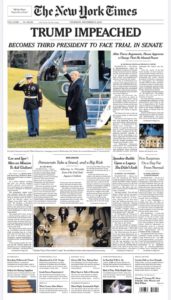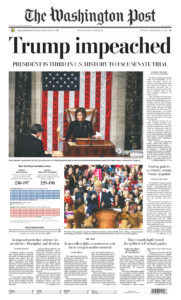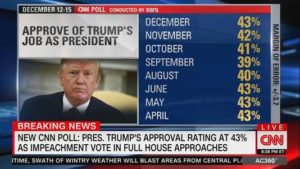For just the third time in the story of the American republic, the House of Representatives voted on Wednesday to impeach a president, with a rallying cry that “no-one is above the law.” After about eight hours of debate Donald Trump joined Andrew Johnson (1868) and Bill Clinton (1998) as the only presidents to be impeached, after the Democrat-controlled House, in an historic rebuke, voted to pass both articles of impeachment charging the current incumbent with obstruction of congress and abuse of power. The outcome forever changes Trump’s legacy, and, as the AP’s Jonathan Lemire says, rewrites the first line of his obituary.
Media reaction was probably as you would expect. MSNBC’s Chris Hayes said last night was “the first time in the man’s life he is facing any concrete judgment on the nature of his behavior,” while Fox News’s Laura Ingraham described the impeachment process as a “cheap traveling carnival that never leaves town.”
 The next step is that the articles now move to the Senate, where the president would face a trial, overseen by the chief justice of the US Supreme Court, which could see Trump convicted and removed from office – even if such an outcome is unlikely given that body’s Republican majority.
The next step is that the articles now move to the Senate, where the president would face a trial, overseen by the chief justice of the US Supreme Court, which could see Trump convicted and removed from office – even if such an outcome is unlikely given that body’s Republican majority.
But not so fast…
At a press conference after the final vote, Speaker Nancy Pelosi indicated she was not committed to immediately transmitting the articles to the upper chamber. Pelosi would not be specific about a timeline for sending the articles – which is required to formally begin the trial – because of concerns that the Republicans would not conduct the proceedings in a fair way. Senate majority leader Mitch McConnell has already bragged he would not be impartial and Pelosi’s apparent hold-out strategy could force the Senate GOP to make concessions over witnesses and the structure of the trial, which is still expected to take place in early January. Any delay would deny Trump the swift acquittal he might expect by the GOP majority in the Senate, but Pelosi would have to balance that leverage against antagonizing voters in a divided nation who might be turned off by excessively politicizing the process.
 While the day was undoubtedly burdened with history it was often not Congress’s finest hour as a deliberative body, as a stream of House members took turns during the debate to stand and be recognized for as little as 35 seconds; barely enough time for them to “rise with a heavy heart” or bemoan “a dark day for America” before laying out their pro- or anti-impeachment stance in a series of clipped clichés designed for fundraising videos in their home districts. But it was particularly demoralizing to see House Republicans – one even compared Trump’s treatment to that of Jesus – line up to unimaginatively defend the president in what Dana Milbank at the Washington Post called a “triumph for alternative facts.”
While the day was undoubtedly burdened with history it was often not Congress’s finest hour as a deliberative body, as a stream of House members took turns during the debate to stand and be recognized for as little as 35 seconds; barely enough time for them to “rise with a heavy heart” or bemoan “a dark day for America” before laying out their pro- or anti-impeachment stance in a series of clipped clichés designed for fundraising videos in their home districts. But it was particularly demoralizing to see House Republicans – one even compared Trump’s treatment to that of Jesus – line up to unimaginatively defend the president in what Dana Milbank at the Washington Post called a “triumph for alternative facts.”
It was left to Senate minority leader Kevin McCarthy to wrap up for the GOP – yes, the same Kevin McCarthy who said in 2016 that “I think Putin pays Trump” – before intelligence committee chairman Adam Schiff in his closing statement said: “Those who excuse the President’s conduct because of partisan loyalty betray their oath of office. But I intend to uphold mine.”
What is at risk here is the very idea of America:
That we are a nation of laws, not of men.
Those who excuse the President's conduct because of partisan loyalty betray their oath of office. But I intend to uphold mine.
I voted to impeach Donald J. Trump. pic.twitter.com/4qvlOag9N5
— Adam Schiff (@RepAdamSchiff) December 19, 2019
Some split-screen fireworks were expected from a MAGA rally in Battle Creek, Michigan – where young Americans used to send their cereal box tops to redeem for cheap gifts – as the president waited for voting to start in the House before taking the stage and asking his audience, bizarrely: “Did you notice everybody is saying Merry Christmas again?” But the takeaway of the evening turned out to be an ill-judged remark by the president about the late congressman John Dingell.
It had been a strange build-up to yesterday’s vote. Protesters had gathered across the country the night before in support of impeachment, while the president had again stolen the headlines by circulating what some called an “unhinged” six-page letter addressed to Speaker Pelosi.
Jonathan Chait wrote at New York magazine that “If you worked in print media, you became accustomed to receiving long, unhinged letters from agitated members of the general public. Often these letters tied together facts, pseudo-facts, paranoid insinuations, dramatic though false legal interpretations, unconventional punctuation, and occasionally, threats. It is at this point unsurprising, though still quite unsettling, to read one of these letters from the hand of the president of the United States.”
This last desperate pre-impeachment howl from an increasingly unpredictable president came at the conclusion of a genuinely strange few days in which this was an actual headline in the Washington Post.
But yet, while Trump’s inability to restrain himself stems from holding onto what he imagines is his reputation as a president, such panic is in all likelihood unnecessary when it comes to actually keeping his job, since no president has ever been removed from office through the impeachment process.
As Washington Post columnist Jennifer Rubin writes: “Perhaps some small number of Senate Republicans will decide to separate themselves from the pack of Trump worshipers. Some might demand a real trial with witnesses or even vote for impeachment. And if not, they, too, will join the other moral weaklings who failed their country when it needed them to do their jobs.”
But while there probably won’t be a single Republican vote, let alone the number required to convict in the Senate – indeed, some Democrats likely won’t even vote to remove the president – it would be wrong to say there are no inklings of insurrection on the GOP side, albeit outside the elected bodies. We have already had campaign videos from a group called Republicans for the Rule of Law, and this week also saw the launch of the Lincoln Project, a political action committee fronted by high-profile former Republican strategists including Steve Schmidt and Rick Wilson.
Other, pro-GOP strategists, of course, believe the impeachment episode will ultimately benefit Trump in his re-election bid and despite Wednesday’s events, the simple fact remains that if he’s still in office come next November, Donald Trump and his GOP enablers may well feel justifiably re-invigorated about prospects for his re-election.
Democrats set for first post-impeachment debate
For the men and women jostling to be the candidate aiming to replace Donald Trump next November, Thursday night sees their latest televised debate. But, as Northern Slant’s Julia Flanagan writes, it was touch and go for a while whether it would take place at all.
An ongoing labour dispute at the debate venue – Loyola Marymount University in Los Angeles – between the campus and contractors, had resulted in all seven candidates threatening to skip the debate to avoid crossing the picket line. To do anything else would certainly ensure pushback from organised labour groups, a core voting bloc for the Democratic party. In a late plot twist on Tuesday afternoon, the Democratic National Committee (DNC) stepped in to broker a resolution to the dispute, allowing the debate to go ahead.
Who’s in?
This week’s debate stage will be smallest and least diverse of the 2020 campaign so far. From 20 candidates six months ago, only seven candidates have qualified as per the requirements set by the DNC: former Vice President Biden, Sen. Elizabeth Warren, Sen. Amy Klobuchar, Mayor Pete Buttigieg, Sen. Bernie Sanders, entrepreneur Andrew Yang, and billionaire Tom Steyer.
The DNC had raised the criteria once again requiring candidates to certify that they had at least 200,000 unique donors. Candidates were also required to meet a polling threshold of 4% in at least four DNC-sanctioned national polls or in single-state polls in the early contest states of Iowa, New Hampshire, South Carolina, and/or Nevada.
The following candidates did not meet the criteria this time: Sen. Cory Booker, former Housing and Urban Development secretary Julian Castro, Sen. Michael Bennet, Rep. Tulsi Gabbard – who was the sole Democrat to vote “present” (the equivalent of abstaining) in Wednesday’s impeachment vote – Rep. John Delaney, author Marianne Williamson, and the two most recent candidates to enter the race, former Massachusetts governor Deval Patrick and billionaire former New York City mayor, Michael Bloomberg.
Notably, after Senator Kamala Harris withdrew from the race this month, despite having met this week’s qualifying criteria, there was speculation that a top tier candidate, perhaps Joe Biden, may reach out to discuss a VP spot on the Democratic ticket. Harris’s exit from the race has prompted questions about the decline of candidates of colour qualifying for the debate, despite being praised earlier this year as the most diverse primary field in US political history.
Six of the seven candidates to qualify for Thursday’s debate are white – former Vice President Joe Biden; Sens. Elizabeth Warren, Bernie Sanders, and Amy Klobuchar; Mayor Pete Buttigieg; and businessman Tom Steyer. There is just one who is a candidate of color: businessman Andrew Yang, the first Asian-American to run for President.
As a result a number of the candidates have written to the DNC to encourage them to ease the rules for qualifying for future debates. Led by Sen Booker, one of two African-Americans left in the race, the letter states that the criteria have “unnecessarily and artificially narrowed” the diverse pool of presidential candidates “before voters have had a chance to be heard… As a result, candidates who have proven both their viability and their commitment to the Democratic Party are being prematurely cut out of the nominating contest before many voters have even tuned in – much less made their decision about whom to support.”
Despite all of this, Wednesday’s impeachment vote in the House of Representatives will undoubtedly present challenges going forward for Democrats and their presidential candidates.
Is impeachment a mistake?
Undoubtedly there is a forceful group of voters on the left of the party that will react positively to impeachment, but the American public generally is still evenly spilt over whether the President should be removed from office. The president’s approval rating, meanwhile, has barely shifted over the past several months. So will Trump’s likely eventual survival at the end of the process hurt the Democrats in 2020? While Trump will certainly use his current situation to rally his base – he’s already fundraising successfully on the back of impeachment – the challenge for the Democratic candidates in the coming weeks and months is to find a balance between their policy messaging and how they position their individual narratives about impeachment. That could turn out to be nothing less than a conversation with the American people about who we are and what we care about.
So will Trump’s likely eventual survival at the end of the process hurt the Democrats in 2020? While Trump will certainly use his current situation to rally his base – he’s already fundraising successfully on the back of impeachment – the challenge for the Democratic candidates in the coming weeks and months is to find a balance between their policy messaging and how they position their individual narratives about impeachment. That could turn out to be nothing less than a conversation with the American people about who we are and what we care about.
A lot can happen between now and the next Democratic debate in the new year – and a lot more will happen between now and next November. But with events this week, the backdrop has most definitely changed.
Read Northern Slant’s Julia Flanagan on the previous Democratic debates here:
The Road to Iowa Goes Through Georgia – November
A Dozen Deliberative Dems Debate – October
And Then There Were Ten… For Now – September
